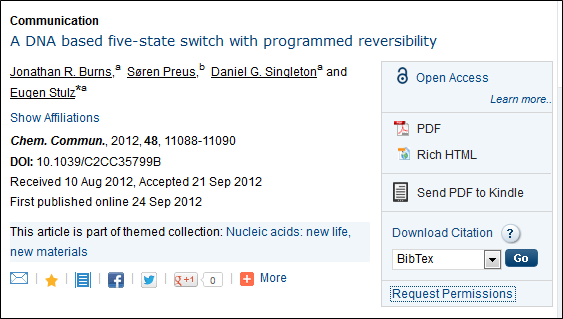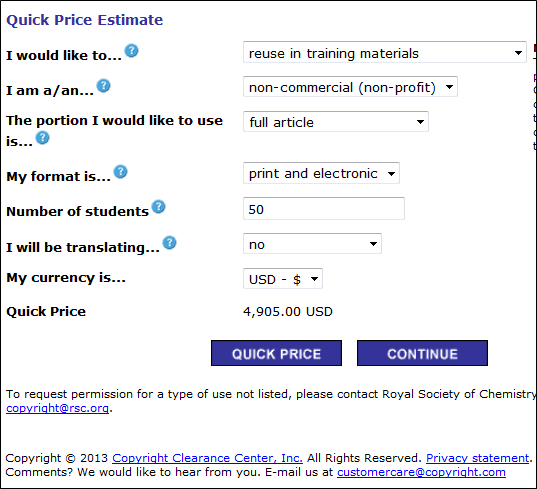Nearly a year ago I blogged that the Royal Society of Chemistry was charging ca 100 USD per student for re-use of a 2-page “Open Access” article (/pmr/2012/11/06/royal-society-of-chemistry-will-charge-students-for-re-using-gold-open-access-articles ). The RSC has responded (very slowly) and in June replied to this blog: /pmr/2012/11/06/royal-society-of-chemistry-will-charge-students-for-re-using-gold-open-access-articles/#comment-138142 :
An update, to show we deliver on our commitments:
We’ve fixed the Rights Permissions problem on OA articles. Now also clear licence information on the article, including CC-BY as an option.
e.g. http://doi.org/mt4
So I went back to the article:

Clicked on “Request permissions” and got:

So just the same 100 USD per student. This has been “fixed”? “Delivering on commitments”? Doesn’t look as if the RSC even tried it (it takes 2 minutes to check).
Now I don’t suspect that RSC are deliberately continuing to try to charge people for Open Access articles. But it raises the question of their competence – and probably many other publishers – in assuming that Open Access articles are managed properly. And any errors seem to be in the publishers’ favour.
Peter, when I click on it from home (so no fancy authentication), I get the link and text following, not your screen grab.
It’s fixed!
http://pubs.rsc.org/en/Content/RequestPermission?msid=C2CC35799B
A DNA based five-state switch with programmed reversibility
J. R. Burns, S. Preus, D. G. Singleton and E. Stulz, Chem. Commun., 2012, 48, 11088
DOI: 10.1039/C2CC35799B
This is an Open Access article. The full version of this article can be posted on a website/blog, posted on an intranet, photocopied, emailed, distributed in a course pack or distributed in CME materials provided that it is not used for commercial purposes.
If you are not the author of this article and you wish to reproduce material from it in a third party non-RSC publication you must formally request permission using RightsLink. Go to our Instructions for using RightsLink page for details.
Authors contributing to RSC publications (journal articles, books or book chapters) do not need to formally request permission to reproduce material contained in this article provided that the correct acknowledgement is given with the reproduced material.
Reproduced material should be attributed as follows:
For reproduction of material from NJC:
Reproduced from Ref. XX with permission from the Centre National de la Recherche Scientifique (CNRS) and The Royal Society of Chemistry.
For reproduction of material from PCCP:
Reproduced from Ref. XX with permission from the PCCP Owner Societies.
For reproduction of material from PPS:
Reproduced from Ref. XX with permission from the European Society for Photobiology, the European Photochemistry Association, and The Royal Society of Chemistry.
For reproduction of material from all other RSC journals and books:
Reproduced from Ref. XX with permission from The Royal Society of Chemistry.
If the material has been adapted instead of reproduced from the original RSC publication “Reproduced from” can be substituted with “Adapted from”.
In all cases the Ref. XX is the XXth reference in the list of references.
If you are the author of this article you do not need to formally request permission to reproduce figures, diagrams etc. contained in this article in third party publications or in a thesis or dissertation provided that the correct acknowledgement is given with the reproduced material.
Reproduced material should be attributed as follows:
For reproduction of material from NJC:
[Original citation] – Reproduced by permission of The Royal Society of Chemistry (RSC) on behalf of the Centre National de la Recherche Scientifique (CNRS) and the RSC.
For reproduction of material from PCCP:
[Original citation] – Reproduced by permission of the PCCP Owner Societies.
For reproduction of material from PPS:
[Original citation] – Reproduced by permission of The Royal Society of Chemistry (RSC) on behalf of the European Society for Photobiology, the European Photochemistry Association, and RSC.
For reproduction of material from all other RSC journals:
[Original citation] – Reproduced by permission of The Royal Society of Chemistry.
If you are the author of this article you still need to obtain permission to reproduce the whole article in a third party publication with the exception of reproduction of the whole article in a thesis or dissertation.
Information about reproducing material from RSC articles with different licences is available on our Permission Requests page.
Reading this post, you could also be forgiven for thinking we didn’t respond to the post in November. We did, at the time, in detail – and since then we’ve spent time switching our OA licenses to CC, getting all the loose ends tidied and finally putting in the right labelling and metadata on the website to support the new licensing. The latter, incidentally, coordinated with Cameron so the licensing can be picked up easily.
And in all this time (and indeed ever) we haven’t taken any money for OA article licensing though this route.
Peter shouldn’t need to request access via RightsLink if it is licensed under CC-BY. It’s not CC-BY-ASKUSFIRST…
Thanks David,
The key point is there is huge uncertainty and if I get it wrong I may be sued.
David –
This is a legacy article with our then bespoke open licence, so this one wasn’t CC anything.
In this blog post Peter has chosen to omit both the actual screen shown when you chick on “Request Permissions” screen and his subsequent choice to select a commercial option – which gives a wholly misleading impression.
Peter got the screen allowing use in course packs, then chose the ‘commercial option’ as his opinion is that teaching is a commercial activity (not an opinion shared by RSC). He chose not to report this in this post.
This is also an old bespoke licence, and now we use CC (see the link Peter quotes at the top)
Editing out inconvenient evidence (and to let this stand uncorrected) is not acceptable practice in my world.